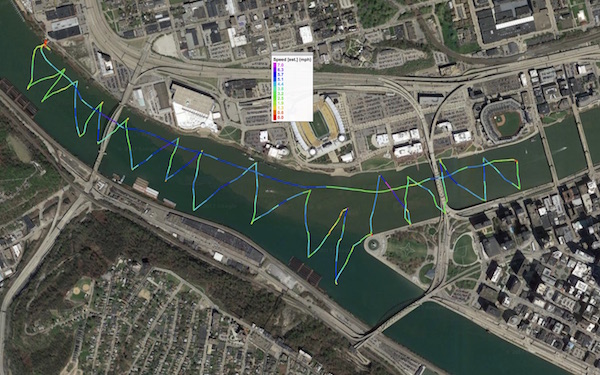Getting to the Point
August 27, 2017
Will I make it to the Point today?
That was the big question to be asked as I prepared for an afternoon sail on the rivers around Pittsburgh's Point. Setting off from the Newport Marina about a mile and a quarter downstream of the Point, I normally sail with winds that blow against the current of the Ohio River. Since they just blow me straight up to the Point, they likely beat any mild current I might face.
Today, however, the forecast was calling for Southeasterly winds that would blow with the current on the Mon and Ohio Rivers:
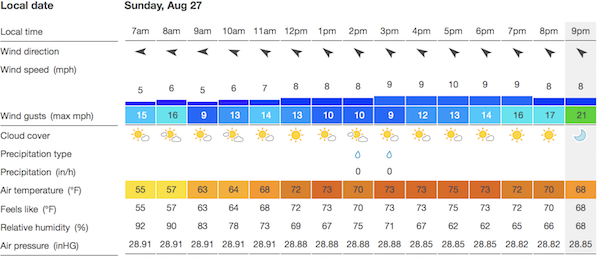
That is the worst combination. If the wind speed matches the current exactly, a sailboat is dead in the water. The current just carries the boat with the wind. The boat will feel trapped in immobile, lifeless air.
However the currents on the rivers have now finally dropped to almost nothing. Here is the flow on the Ohio River, where I put into the water at the Newport Marina:
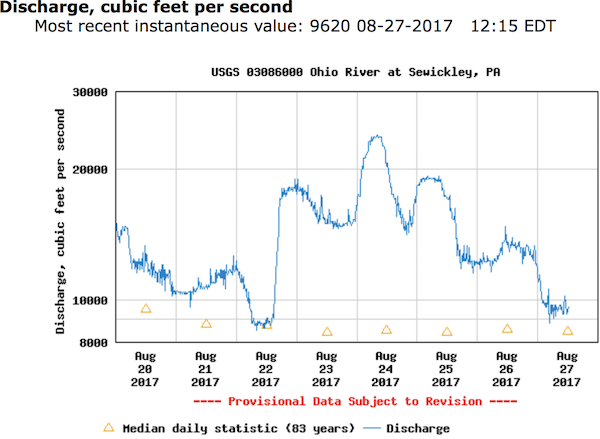
The chart shows that it has finally dropped to median levels for this time of year. 9,620 cubic feet per second corresponds to a barely perceptible flow of about 0.2 mph. Nonetheless, while the arithmetic of adding speeds seems to say otherwise, I've found a current as slight as this takes effort to overcome.
So I set out with a cautious eye on the wind. Riding my bicycle over the Ninth Street, I paused to measure the wind speed. It was a mild 3.3 mph along the river. Not good, but not terrible.
A Southeasterly wind is blocked by the buildings of downtown, so seeing any wind at all was a good thing. The wind at the Del Monte Pier was less, as expected: 0.4 mph.
The measurement was taken closer to the water, where the obstruction of the downtown buildings was more complete.
Arriving at the marina, my boat is resting quietly under its tarpaulin. The bagged mast is in the foreground.
At the marina, walking out as far as I could onto a dock, I measured a still meager wind speed of 3.2 mph. It was not quite enough to make speedy progress to the Point.
The ripples on the water's surface suggested more wind farther out into the river. So I decided to risk it. Let's set out and see what happens. Once I get into the river proper, all should be well. Or so I hoped.
So I stepped the mast and had my sailboat rigged and ready to go.
I paused before setting out. A barge was arriving at the barge dock opposite.
It was soon tied up and the river was mine again. I set off at 3:20 pm. At first, the winds were meager and my speeds were down around 2-3 mph. Since I needed to tack ("zig-zag") to and fro across the river to make way into the wind towards the Point, that made for slow progress. Each tack gained only perhaps tens of yards. But then about half way to the West End Bridge, the winds came. I could now sail at a worthier speed of around 3-5 mph. In a little boat like the Hobie Bravo, when you are just inches from the water's surface, that is a quite satisfying speed.
All this can be seen in the gps plot, which is color coded for speed. The shades of blue pick out speeds around 5 mph.
Once I make it to the West End Bridge, I know I'll make it to the Point as well. So it is a relief to approach it.
...and then to pass under it.
As I passed under the bridge, I was paying only scant attention to what was happening upstream. I'd seen something out of the corner of my eye. Now I looked again and saw what it was. A large barge had been pushed out of its moorings just upstream of the bridge and was lying across the river.
It's only just visible in the photo, but it was very large to me from the deck of my boat. I discerned pretty quickly that the barge was being turned to come downstream and would pass directly over my intended course. I tacked and turned by bows towards the giant. I quickly did the mental projections all sailors learn to do.
If I sailed towards the barge, but not too quickly, it would like pass in front of my bows and head off into the distance, downstream. After a short pause, I pulled in the main sheet (= rope that controls the sail) and started off, but I slackened off the main sheet a little so that my speed was kept down.
And that is just what happened. The barge passed in front of my bows and disappeared downstream. Juggling the rudder, main sheet and my camera, I managed to document its passing:
I was dancing with giants again. Here is a detail of the gps plot on which I've indicated roughly the motion of barge:
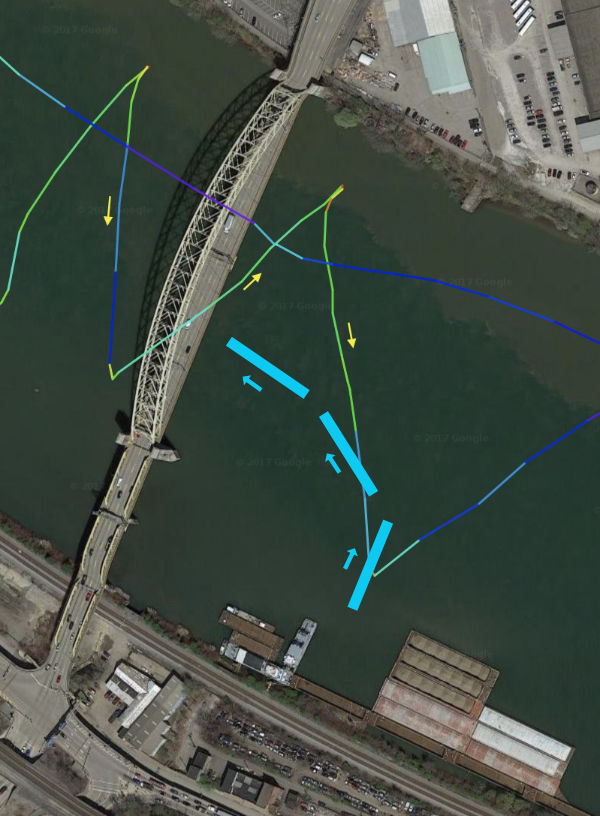
The giant had passed and I could return to the business of the moment: laboriously tacking my way towards the Point.
Here I've advanced to line up with the Science Center. I notice a rising, darkening cloud behind it. No rain was forecast, but this one needed to be watched. It was, in life, quite darker and more ominous than in the photo.
As I slowly made my way to the Point, I was picking a course past the scattering of small boats spread over the water. It is the last Sunday of August and everyone who can is making the most of a waning summer.
By 4:15 pm, I was finally just off the Point. It had taken 55 minutes to make the sail. That was slow progress, but not bad for the conditions. The winds seemed to be fading as I neared the Point, so I needed more tacks that I expected before I finally grazed the Point and docked at 4:25 pm.
This close to the Point, there are no places to tie off a docking line. So I threw the line to a helpful hand on land and called out: "May I ask you to hold this?!" That was enough to enable me to land and stretch my legs.
By 4:40 pm, I recovered enough from the stiffness of 55 minutes on a small, cramped sailboat deck and I set out again. (The gps track shows me docking again, almost immediately, slightly farther upriver on the same bank. I picked up a flurry of text messages between my wife and son. While under way, I cannot read them. I wondered if they were intended for me. Some disaster at home? So I docked and took my phone out of its waterproof carrier. Fortunately, all was well.)
I now proceeded up the Allegheny. Earlier in the day, the winds had been shielded on the Allegheny, but now they seemed to be blowing along the Allegheny River towards the Point. Evidently, they had shifted and subsequent weather records showed a mix of Southeasterly, Southerly and Easterly winds for the time of my sail. Here are two reports (that show the same data in different forms):
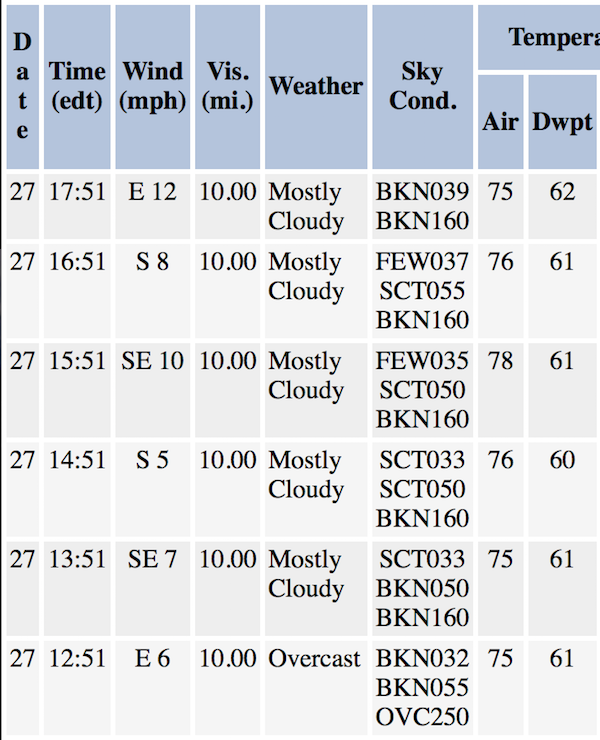
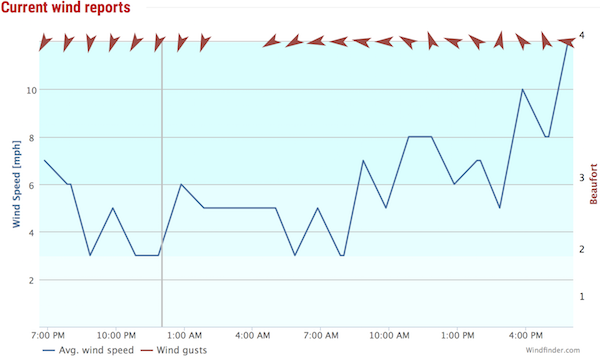
They show that the winds had freshened to a lovely 8-10 mph, but with some variability in direction.
This was not a gift to be questioned. The winds were not supposed to be good for sailing on the Allegheny, but here they were. So I sailed towards the Fort Duquesne Bridge:
Now came a little bit of sailing bravado. Directly ahead of my bows in this photo are narrow passageways under the Southern pylons of the Fort Duquesne Bridge. To avoid them, I would eventually have to tack. Every time I tack, I lose speed and time and have to scurry around on deck getting all set for the new direction. So the temptation is to keep going and sail through them.
The maneuver would be something like threading a needle.
Why not? So I sailed up and into the passageways and tacked, to point my bows back towards the river. Here's a photo taken after the tack:
And another taken looking back after I'd threaded the needle:
This portion of the gps track shows my course.
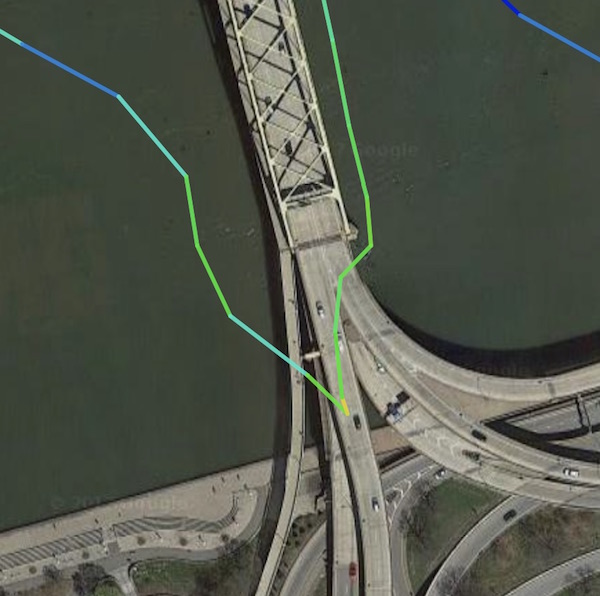
I now sailed on farther up the Allegheny River.
By 5pm, I was tired enough that it seemed prudent to turn and head for home. Eve was expecting me to help with a little dinner party she'd organized and I'd assured her I'd be home by 7pm at the latest.
At that moment, the winds died, as if to tell me that, yes--it is time to head back.
So I turned my bows back towards the Point and waited for the wind to fill my sail and blow me home. This part of the sail is leisurely. The wind is at my stern, so I just sail with it. There is little to calculate, since there are no tacks to plan.
I played catch up for a while with a Ducky Tours boat.
Then I saw that other boaters were preparing to leave. There were some dark clouds still lingering, but now they'd moved from the Eastern sky to the Western sky. Here's a boater weighing anchor with the dark clouds behind.
As I proceeded down the Ohio towards the marina, the winds freshened and I could make 5-6 mph speeds. Looking back over the stern, the buildings of downtown receded into my bubbling wake:
John D. Norton
Back to main
